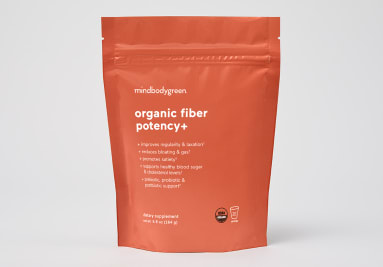
Image by Guille Faingold / Stocksy
December 31, 2022
Did you know that a whopping 95% of Americans1 aren’t getting enough fiber in their daily diet?! Yes, you read that correctly—only 5% of Americans are consuming the recommended daily fiber amount to adequately support optimal gut health, bowel movements, detoxification, and whole-body well-being!
Truthfully, fiber isn’t at the top of most people’s nutritional priority list—but considering its vast range of critical health benefits, we’re making the argument that it absolutely should be.
Advertisement
This ad is displayed using third party content and we do not control its accessibility features.
Listen, we get it. It’s tough enough to make sure you’re getting adequate sleep, movement, protein, water, vitamin D…(the list goes on and on). That’s why we’ve put together this short-and-sweet list of things you can start doing to ensure you’re getting adequate fiber in your diet every single day.
1.
Take a fiber supplement.
Including a fiber supplement in your daily well-being routine can help you meet the recommended intake of daily fiber.
mindbodygreen’s own fiber supplement, organic fiber potency+, was created to help bridge the fiber gap in our nation.
It includes soluble and insoluble fiber from an array of organic plant ingredients (guar bean, kiwifruit, and a trio of mushrooms) to holistically support your gut health, bowel movements, and overall well-being.* Bonus: Adding a fiber powder to your routine couldn’t be easier—simply scoop into a beverage, smoothie, or soup—and sip away!
Advertisement
This ad is displayed using third party content and we do not control its accessibility features.
2.
Switch to whole grains.
Swapping refined, processed grains (think: white bread, white flour, white rice) for whole, high-fiber grains like quinoa, buckwheat, oats, whole wheat pasta, barley, and brown and wild rice is a simple but impactful way to add more fiber to your diet.
3.
Load up your plate with plant foods.
Fruits, vegetables, legumes, nuts, and seeds are all rich with fiber. In other words? The more plants you’re able to add to each meal, the better!
Make it a challenge to make each meal as diverse and abundant with plant foods as possible to ensure you’re giving your body the fiber it needs and supporting your gut microbiome with a diverse and nutrient-abundant diet. (Let’s be honest, plant foods are just plain fun and delicious as well! They add color, flavor, and nutrients to every dish. Win win!)
Advertisement
This ad is displayed using third party content and we do not control its accessibility features.
The takeaway.
I think “eating more fiber” should be everyone’s New Year’s resolution! Follow these tips to ensure you’re getting enough fiber to promote healthy bowel movements, gut function, healthy blood sugar balance, and so much more.
If you are pregnant, breastfeeding, or taking medications, consult with your doctor before starting a supplement routine. It is always optimal to consult with a health care provider when considering what supplements are right for you.


